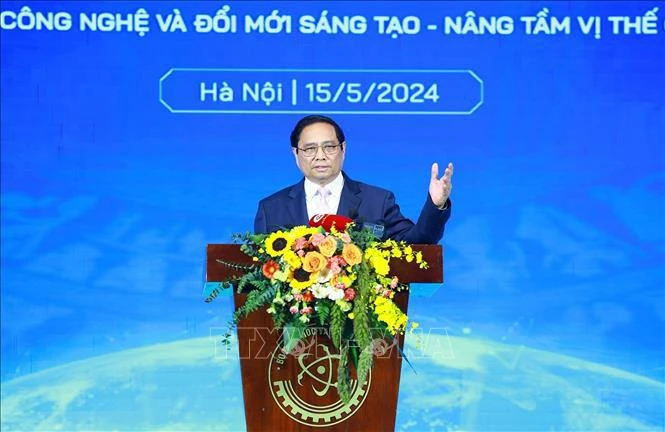 |
| Prime Minister Pham Minh Chinh says science-technology is a vital element for the country to catch up with the world amidst the fourth industrial revolution-related technology boom. (Photo: VNA) |
At a ceremony to mark the Vietnamese Science and Technology Day (May 18) and the 65th founding anniversary of the Ministry of Science and Technology, he said science-technology is a vital element for the country to catch up with the world amidst the fourth industrial revolution-related technology boom, citing the success stories of such powers as the Republic of Korea, Japan, China, the US, Germany and Finland in which science-technology played a great role.
Recalling President Ho Chi Minh’s teaching which laid an emphasis on the importance of science-technology to production, productivity and improvement of livelihoods, PM Chinh stressed that the Party and State have rolled out various policies to develop science-technology and promote the role of the intellectuals and scientists.
He highlighted standout sci-tech achievements that the country has made over the past years, including medication against malaria, infectious diseases and dermatology, surgical techniques, weapon creation and construction of modern bridges, adding science-tecnology must be developed with a practical approach to serve the interests of the nation and people.
He took the occasion to hail the scientists who were honoured with the 2024 Ta Quang Buu Awards for their contributions to the sci-tech sector, saying he hopes that their passion for science-technology will be promoted, encouraging the future generations to contribute to the sector.
With a view to realising the resolution adopted at the 13th Party Congress which identified science-technology, innovation and digital transformation as a key motive for economic growth, PM Chinh ordered competent sectors to complete related mechanisms, attract and diversify resources for science-technology, develop sci-tech market, and paid due attention to the R&D activities, among others.
Over the past 65 years, achievements in science-technology and innovation have become a foundation and driver for the country’s sustainable development. They contributed more than 30% to the agricultural sector’s added value, with value of hi-tech products rising over 40% in 2019. The country has succeeded in manufacturing various devices, production chains and new materials, while mastering advanced technologies in disease diagnosis and treatment such as endoscopy, X-ray scanning and transplant.
It has recorded improvement in the World Intellectual Property Organisation’s Global Innovation Index, climbing two notches in the ranking in 2023 to rank 46th out of 132 countries and territories./.